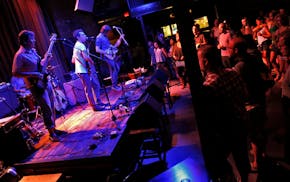For the past 40 years, the Islamic Center of Minnesota has been a place where Muslims have prayed, found resources and created community.
And increasingly, the Fridley mosque and community center is a place where people of many faiths come together not only to learn about Islam, but also to share their own beliefs.
At a 40th anniversary celebration Saturday, the center will mark the occasion with its members, but also with a docket of special guests, including the Roman Catholic archbishop, a congressman, a rabbi, a minister and others.
In 1970, 12 Muslim students at the University of Minnesota created the pioneering group that became the Islamic Center of Minnesota (ICM), in an office at Coffman Memorial Union. As it grew, the group moved to Dinkytown, then to Columbia Heights and eventually to Fridley.
As a traveling student in the early '70s, current ICM President Owais Bayunus used to search for familiar surnames in a new city's directory and make cold calls to ask for directions to a place to pray.
By contrast, when Razina Motala arrived in the Twin Cities 13 years ago, "the ICM was our first stop," he said; Motala is Islamic studies coordinator at the Islamic Institute of Minnesota in Maplewood. "It's been around so long, one couldn't imagine it not being there."
Today there are about 20 mosques across the metro area. Like the others, ICM offers prayer gatherings, weddings, funerals and religious education for Muslim adults and children, including a private K-12 school.
The mosque also works to draw together people of many faiths. It hosts what is believed to be the longest-running Muslim-Christian dialogue series, a monthly gathering that's been going strong for 20 years.
Over the past 3 1/2 years, a Muslim-Jewish group has been meeting as well, including a gathering during the conflict in Gaza in 2008.
Discussions that day were really powerful, said Rabbi Amy Eilberg, director of the interfaith conversations project at the Jay Phillips Center at the University of St. Thomas.
"I've experienced in the Islamic Center of Minnesota's leadership a willingness to continue to develop the relationship," she said, "even when discussing issues where there are deeply felt differences and areas of pain, rather than only being willing to discuss the important but easier dimensions of the dialogue that have to do with celebrating commonalities."
For Saturday's celebration, the menu was crafted to fit each faith's dietary requirements.
"They always do that," Eilberg said.
Maria Elena Baca • 612-673-4409

12 gorgeous new picture books for children this spring
Metro Transit steps up safety efforts with monitors displaying bus behavior for all to see
What we know about the Sen. Nicole Mitchell burglary allegations so far
Man shot by deputy in Montrose allegedly said during earlier clash he'd rather die than be arrested
